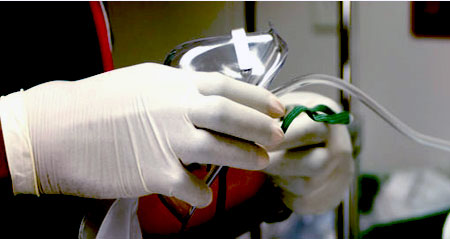The nature of accreditation is that a company embraces a continuous quality improvement methodology and operates its business in compliance with laws, regulations, and industry best practices to the best of its ability. Accreditation is a journey not just a destination – a journey full of learning opportunities, education, and revision and tweaking of your company’s processes and procedures.
That process doesn’t lend itself well to quick “punch lists” and it is not advisable to look for shortcuts along the journey. However,
Read More
Topics:
Quality Standards,
HQAA Accreditation,
HME Accreditation Requirements,
Compliance,
Avoiding Deficiencies
Clinical respiratory services (CRS) are hands on care, assessment, or treatment, governed by state regulations including Respiratory Practice Acts and Licensure Laws. It is usually physician-prescribed in conjunction with medical equipment services. Most of the DME organizations that provide CRS do not get paid for the services and do them as an adjunct to providing some kind of equipment services, such as an oxygen or ventilation program. Because of the limited opportunities for reimbursement for these services, organizations
Read More
Topics:
Quality Care,
Clinical Respiratory Services
HME organizations struggle with the concept and implementation of informing their customers of their financial responsibilities. This area of patient rights is often misunderstood and sometimes poorly implemented by organizations. To establish an effective procedure and mindset for your staff and to serve your customers appropriately, it is important to understand the rationale for this right and requirement.
Read More
Topics:
Billing,
HME Accreditation Requirements,
Compliance
Organizations are sometimes surprised to find out that surveyors look at various state and federal laws along with accreditation standards during the survey. The fact of the matter is that law and regulation overlaps accreditation standards in many ways and in many places. In fact, many accreditation standards have their basis in law and regulation. Standard ORG 2 states that an organization willdemonstrate compliance with “all required federal, state, and local licenses, permits, certifications, and registration requirements”. It also references compliance with Medicare enrollment standards, meaning that you must comply with the Quality Standards, which were the basis for all accreditation standards. Essentially, what ORG 2 says is that you must follow all applicable law and regulation.
Read More
Topics:
Quality Standards,
HQAA Accreditation,
HME Accreditation Requirements,
Compliance
“Ride alongs” are home visits that are performed with a new orientee or current staff member where an evaluator rides along to teach and observe the staff member performing the visit. These visits are typically done during orientation/training and on an on-going basis for competency assessment. These visits ensure that all of job-related tasks are being performed in a correct manner while the staff member is unsupervised in the field.
Read More
Topics:
HIPAA,
Quality Standards,
HME Accreditation Requirements,
Patient Privacy,
Quality Care,
Delivery,
Competence
Home medical equipment companies frequently mention that it seems that the majority of survey (inspection) activity takes place in equipment storage, cleaning, and warehouse areas, as well as out in the field during “ride-alongs” to observe patient interactions with staff.HME staff is sometimes caught by surprise when the surveyor turns their attention to the retail showroom during the inspection. Why would a surveyor want to look at a retail showroom and what accreditation standards apply in that setting?
Read More
Topics:
HME Accreditation Requirements,
Compliance,
Avoiding Deficiencies,
Showroom,
Retail
Consumers have come to expect confidentiality and privacy in all business transactions today, whether on line or in retail establishments. Healthcare is no exception and patient/customers are now protected by HIPAA (the Healthcare Insurance Portability and Accountability Act of 1996). Consumers who have received any healthcare service in a hospital, doctor’s office, medical lab, or pharmacy have been exposed to some education about HIPAA. Medical equipment companies are no different and have some unique issues to plan and prepare for to comply with this complex regulation and the even more fundamental patient right to privacy and confidentiality.
Read More
Topics:
Employee Training,
HIPAA,
Security,
HME Accreditation Requirements,
Patient File Requirements,
Compliance,
Patient Privacy
Say the word “warehouse” and many people conjure up images of a dark, dusty, damp place with rows of equipment and boxes piled to the ceiling.
A home medical equipment company’s warehouse certainly can be the source of problems, deficiencies with standards, safety hazards, and infection control issues. But with just a little planning, some elbow grease, and a bit of ongoing monitoring, you can turn your warehouse into a clean, safe, even pleasant environment that improves operational efficiencies and helps your employees do their job well.
Read More
Topics:
Quality Improvement,
HME Accreditation Requirements,
Avoiding Deficiencies,
Warehouse
How do you ensure your delivery vehicle is roadworthy, safe and prepared for your daily delivery and pick-up activities?
You keep in mind the three keys to an HME accreditation-compliant delivery vehicle: safety, maintenance and security.
Read More
Topics:
HME Accreditation Requirements,
Compliance,
Delivery
In healthcare and the healthcare workplace, competency assessment has become crucial to ensuring employees—particularly those providing direct patient care—have the necessary training and skill to do their job and care for their patients.
For DMEs that provides medical equipment and supplies to patients, this concept of assessing and maintaining staff competence is crucial, and sometimes misunderstood.
Read More
Topics:
Employee Training,
HQAA Accreditation,
HME Accreditation Requirements,
Competence











